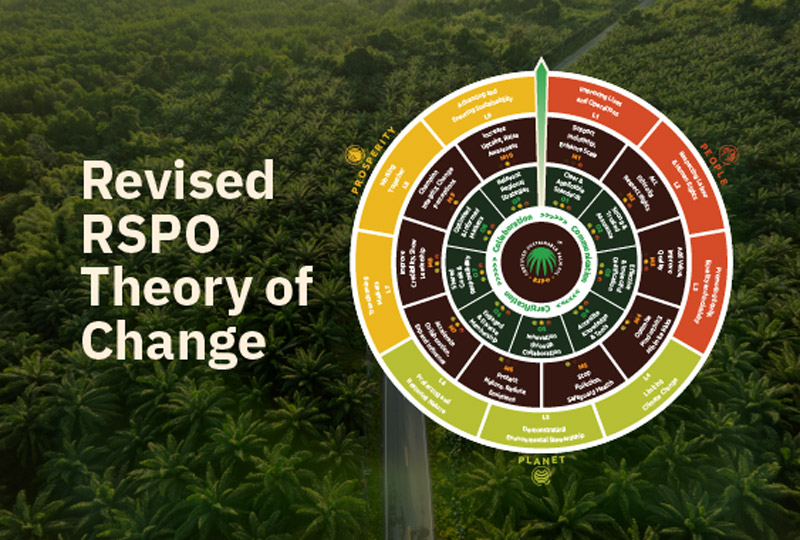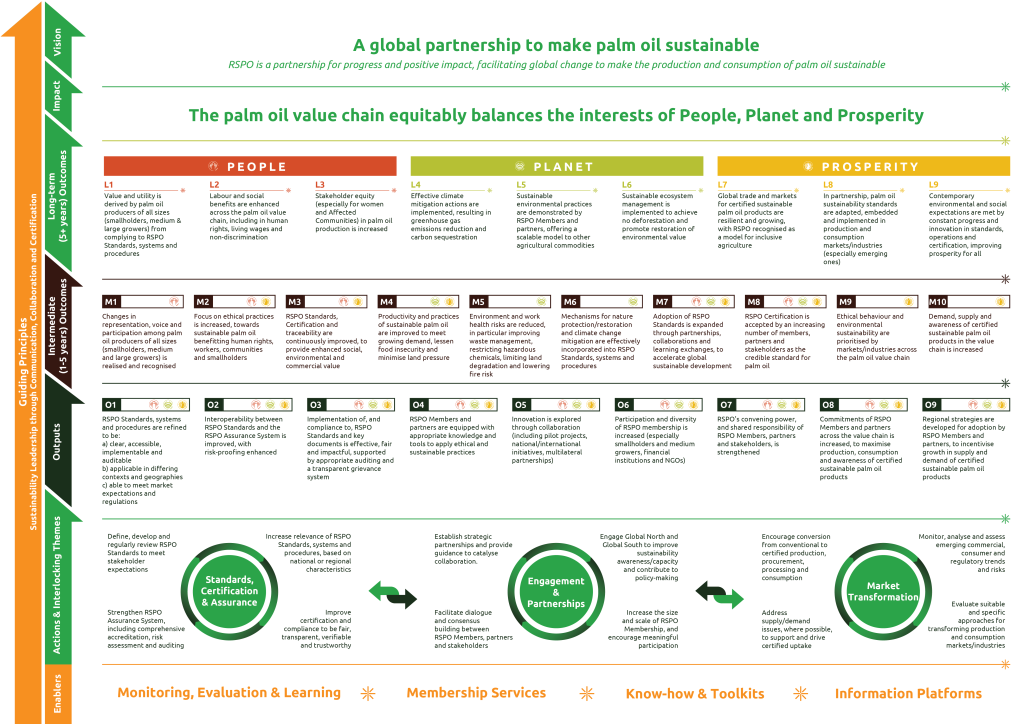
The revised Theory of Change marks a new chapter for RSPO and the wider palm oil industry. It represents not just a refinement of the RSPO approach, but also a bold step towards creating lasting, meaningful impacts.
Following a thorough public consultation and input from diverse perspectives, the RSPO Theory of Change (ToC) was refined to better reflect RSPO’s new vision as “a global partnership to make palm oil sustainable.” The ToC is the conceptual framework that outlines RSPO’s desired changes, identifying key actions and pathways needed to create lasting, measurable impacts for people, planet and prosperity. The revision process, which began in July 2022, involved extensive feedback from internal and external stakeholders.
Behind the Revision: Responding to a changing world
The world is changing rapidly – climate change, biodiversity loss, and growing demands for ethical business practices have reshaped the global sustainability conversation. Mindful of this, the ToC revision was necessitated by the changing dynamics in the palm oil sector and the urgent need for RSPO to stay ahead of sustainability challenges, while also preparing the industry for the future.
The primary goal of revising the ToC is to better articulate RSPO’s intent and ambitions, clearly defining the desired change. This update ensures alignment with RSPO’s evolving agenda, activities, and strategic direction.
Moving away from linear thinking: a holistic approach
One of the key improvements in the revised ToC is a shift away from linear cause-and-effect models. Sustainability in palm oil production is far from a simple, one-dimensional problem. It involves complex, interrelated factors that require a more dynamic approach to change. The revised ToC embraces this complexity by depicting the interconnected pathways that drive sustainable outcomes.
Key Tools:

ToC Diagram: The revised ToC is presented in two visual diagrams: a comprehensive version for detailed understanding of the causal pathways underlying the ToC, and a simplified version that highlights key expected outputs, outcomes and impact for general broader communication.
ToC Narrative Document: A comprehensive document that provides an explanation of RSPO’s intended outcomes and impacts, outlining the causal pathways, underlying assumptions, and potential risks underlying the revised ToC.
ToC Microsite: An interactive platform designed to visually illustrate and animate the interconnections and interdependencies of the revised ToC elements.
ToC Monitoring and Evaluation (M&E) Framework: A framework to measure progress and achievement of the revised RSPO ToC. It incorporates Key Performance Indicators for each output, intermediate outcome and long-term outcome, identified based on available data and information sourced from within the organisation and from RSPO Standards, systems and procedures.
What this means for the wider industry – and you
At its core, the revised RSPO ToC is about collaboration. No single stakeholder can drive the necessary change alone. Whether you are a smallholder, a large producer, a consumer, or a sustainability advocate, your role in this journey is critical. Through a shared commitment to sustainability, palm oil is produced, sourced, and consumed in ways that benefit both people and the planet while creating long-term prosperity for all.
Adopting innovation and enhanced sustainability practices can make a lasting impact on the environment, communities, and global markets. By anticipating emerging issues and incorporating new insights, the RSPO is well-positioned to lead the next phase of transformation in sustainable palm oil.
To access the Revised Theory of Change, click here.
Keep reading

Book Your Slot for the Additional prisma Clinic Session at RT2025

Advancing Jurisdictional Certification in Sabah: Strengthening Collaboration Between RSPO, UNDP, and Jurisdictional Approach System for Palm Oil (JASPO)
Call for Expression of Interest: Independent Investigation of a Complaint

Leading Labels: RSPO Among Top Sustainability Labels in Dutch Market

The 21st International Oil Palm Conference Successfully Took Place in Cartagena, Colombia

Top Performers of the 2025 Shared Responsibility Scorecard

ACOP 2024: RSPO Market Trends Resilient Despite Global Challenges

RSPO: Actions for the Certification of Sustainable Palm Oil Production




